- Home
- Cameron Jace
Wheel of Fortune Page 2
Wheel of Fortune Read online
Page 2
“Generation Z,” the boy follows on, “was the last generation of youngsters before the Great Disease. They were born with the latest technologies around. They were smart, effective, and powerful. Most of all, they started opposing governments all over the world using technologies similar to the iAm to communicate with each other. In fact, the Amerikaz was the last government of all. At sixteen, each teen of Generation Z had the knowledge and experience of a fifty-year-old of the time.”
“How was that possible?” I ask.
“Because there were no cell phones, no internet, and no networks before Generation Z. The elders never really comprehended the sudden and fast changes the youngsters had learned. When the elders were teens themselves, it was much harder to communicate and spread information, harder than all of us could imagine.”
“What do you mean they had no internet?” I ask again, not minding if I sound like an idiot.
“It’s hard to imagine. I know,” Roger This says. Although he seems invisible sometimes, I am astonished that he is still alive. “Before the internet, they had to go to a library full of stuffed books and keep on searching for days for whatever they wanted to know about. Can you imagine flipping through papers to find what you’re searching for without search engines like Zoogle and sites like Zikipedia?”
”Come on,” Bellona says to me. “It’s not like the internet grew up like trees when elephants first roamed the earth.”
“It’s not elephants that first roamed the earth,” Pepper objects. “That’s a rumor. It was dinosaurs.”
“I don’t care if it was Michael Zackson who first roamed the earth. Stop being so picky,” Bellona fires back at her. I don’t see a friendship ever happening between those two.
“Easy, girls.” I wave the tip of my white t-shirt as a flag in the air — why I am not surprised it’s covered in blood? “So there was this Great Disease war between Generation Z and the elders. And?” I ask.
“Generation Z changed everything in terms of taste in music, movies, arts, politics, free thinking, and free knowledge. Generation Z, in every country in the world, continued to be a major threat to the governments who claimed they were practicing something called democracy, which is just another disguise for a totalitarian system like ours.”
“Wow,” I say. “How do you know all this?” I don’t understand half of what she just said.
“That’s why we’re here,” the skater boy says. “Because we know all of this. You’re not meant to know stuff like that, not when you occupy yourself with getting ranked.”
“I am starting to see why you don’t belong here,” Bellona tells me. “You’re just like every other teen out there, working desperately for approval, so your mommy, daddy, teachers, and friends think highly of you. In short, you’re a slave to your rank, which shows me that Prophet Xitler’s plan is working.”
“Is that why everything usually has a letter Z in it?” I ask, ignoring Bellona’s army-girl aggressiveness. Should I reveal my heroic act of entering the show to save my best friend? I want to tell Bellona that pink hair and green army outfits don’t really match. But if I do, she might stick a knife in me. Didn’t I just save her life, or was I dreaming? “Xitler being pronounced Zitler, Dizny, Zeinstein, all those words that start with a Z?” I have no idea what’s wrong with these names, but Woo said the Summit was fond of the letter Z. My favorite oldie musician is called David Zowie. Woo said his name was Bowie.
Pepper exchanges looks with the other skaters. “She is getting smarter. I think she isn’t that bad after all.”
“Yes,” the skater boy says. “Xitler is afraid of the teens of this generation. The summit has been changing a letter in everything to a Z. We don’t know why yet, but it has something to do with Generation Z. Also I read on the Breakfast’s club forum that the letter Z has not always been relegated to the end of the alphabet. In the Greek alphabet it came in at a quite respectable number seven.”
“Who are the Greeks?” Pepper asks.
“A civilization that lived before the Amerikaz,” The boy answered. “And then there were the Romans, who were also a pre-Amerikaz civilization. They adopted the letter Z later than the rest of the alphabet because ‘z’ was not a native Latin word, adding it at the end of the letters at the end of their list of letters and using it rarely. Then the Amerikaz simply imitated the Roman’s conventions of placing z last. To sum it up, there has always been a problem about the letter Z since the beginning of Western alphabets.”
“I am confused,” I say. “What does this have to do with the Summit inserting the letter z in every word possible?”
“You don’t get it, do you?” Bellona says. “This,” She waves her hands in the air, pointing at our surroundings. “All this nation is a big hoax. Nothing has to really make sense. When Xitler found the containers under the Burning Man in the desert, half of it was stolen. Vagabonds and marauders have been searching for these containers for years after the Great Disease, but none of them wanted to build a new nation and become its prophet. Only Xitler and his family had this crazy idea that if they found the Arc, they could learn and build a new nation from it using the information. It took years to watch the videos, read the books, and search the hard drives. We’re talking about the history of a nation buried in containers…”
“Incomplete history.” the skater boy remarked.
“It was a mess, and Xitler’s ancestors were hungry to become rulers so they decided to mash up a nation from the incomplete info they got. Basically, they didn’t really know what they were reading so they made a lot of things up. The most important thing they found and studied was the science behind making cell phones so they can control the nation with idea of ranking through the iAm.”
“Why was controlling the nation so important?” I asked.
“We’re not sure,” the boy says. “But we believe that the Xitlers read in details how the Amerikaz ended with rebellions from the younger bad kids. The point is we’re sure that if there was one guy from the time of Amerikaz still alive, he’d be laughing at the culture mish mash we’re living in. If you think of it, how do know about people like David Bowie, Rambo, or Zootube? This stuff happened more than hundreds of years ago. It was passed to us by the Xitlers. And how did they know it? They saw and found it in the Arc containers. And I have to repeat myself, they passed it on incomplete and mish mashed. You know when someone whispers a word in their friend’s ear and they whisper it to the next? What do you think happens to the word when it reaches the tenth friend? It might be a whole different word, derived from the mishearing of the original. It’s the bets way I can explain it.”
“Like why we have Ten days a week for instance,” Bellona says. “I know we worship the number ten in Faya, but there is another reason, also mentioned in the Breakfast Club’s forum. It’s that the French in the ancient times used a different calendar than the rest of the world. In that system, they counted a week as ten days.”
“Are you saying that Xitler only stumbled on this info in the Arc containers and said, ‘Wow. This sounds unique, let’s do it Faya’?” I ask.
“Yes. Stupid and Superficial I know. But the answer is yes,” Bellona said without elaborating, as if she wanted her shocking answer to sink deep in me. How awful is it to find that your world is based on mashed up, incorrect jokes left to you by your ancestors?
“So basically Faya is a bad movie remake of an once-awful movie.” Pepper considered, almost speaking to herself.
“How does the Breakfast Club know all that?” I wonder.
“It’s rumored that they have found the Arc before the Xitlers,” the boy explains. “Only they couldn’t collect enough information before Xitler’s family and their army came and threatened to kill them.”
“I suppose there is a reason why they’re called the Breakfast Club too.” I say.
“Yes,” Bellona smiles. “It’s named after an old movie in the Amerikaz. One that will live forever.”
“Was it about the Monsters?” Pepper wonders.
“Kind of. It was a movie about teens like us.” The boy explains.
I sigh for a moment, taking in all the information, and reminding myself that I didn’t know much about the world. “I see. So what happened next?” I ask.
“What happened next is the story of the iAm itself,” says Bellona. I know this story from Woo, but wouldn’t mind hearing it again from Bellona to confirm the facts. “Believe it or not, the iAm was Generation Z’s idea. They started it for fun, using what they called smartphones at the time to self-quantify themselves.”
“It was also called Body Hacking. Just the same as our iAm now,” says Roger This. I notice his t-shirt is too clean for a boy who fought for his life. “But then the applications started becoming more complex. The software started predicting unusual things, like how well the owner of the smartphone would do in his next exam in school, how long the owner was estimated to live, who the owner would fall in love with. Generation Z thought it was fun.”
“Only the device was controlled individually by each member of Generation Z,” Bellona says. “Meaning that your data was private. You used it to tweak your body and mind the way you liked. It was a logical advancement in technology at the time. It was harmless until—”
“Until the data was controlled and used by the government,” the skater boy says. “The governments thought: ‘What a magical device. We can control Generation Z with this device by knowing everything about them. We don’t need surveillance anymore. We don’t even need to spend money on weapons of war. We practically own teens by knowing everything they do twenty-four-seven.’ And that was the end of the world. The end of democracy, freedom of speech, and everything. No one could do anything without the government knowing it. Everyone got spied on and their future predicted—”
“This is exactly the same world we live in now,” I remark.
“Not exactly,” the skater boy says. “Let me explain. When the government started to control Generation Z by spying on and controlling their data, there was a war going on. It wasn’t possible to brainwash Generation Z and convince them that they had to spend their teenage lives trying to get ranked.”
“And that is what Prophet Xitler did to us,” I nod.
“See?” says Bellona. “Now you’re getting it. No one knows how the Great Disease wiped out most of the population of Earth. Some claim the disease was not a physical one. They say it was a virus spread through phone applications. What we know is that Generation Z decided they should warn us. They decided they would send a hidden message to the future.”
“A hidden message?” Pepper wonders.
“What the Summit calls the Arc, the containers they found buried underneath the Burning Man,” explains Bellona. “The Burning Man is no god like Xitler wants us to believe. It was left for us by Generation Z as a sign to dig underneath and locate their legacy. Like X marks the spot, you know.”
“Originally, the Burning Man was a festive occasion in the Amerikaz where they celebrated freedom of expression. It took place in the Nevada desert,” the skater boy explains. “They built that big structure of a man and set it on fire and celebrated for weeks every year. Unfortunately, Xitler’s ancestors found it. Hundreds of huge containers were buried in the desert, full of the world’s history.”
“That’s like Zikipedia buried in the sand.” Pepper thinks aloud.
“Exactly,” says Bellona. “The Xitlers read the legacy and watched the videos and analyzed the data of the Amerikaz. They decided to create the ranking system and call the device the iAm to build a new nation blindly obedient to their rules. They did it to avoid the mistakes of the Amerikaz, protecting themselves from another emerging Generation Z, which they call the Bad Kidz, or Monsters.”
“So that is who we are?” Pepper speculates. “The Monsters are only an equivalent to Generation Z? The ones who didn’t want to submit blindly to the Summit?”
The skaters nod.
“That is definitely not me,” says Roger This. “I loved the Summit. The computer and internet games they make are so awesome. I am only here because I didn’t study or go to school, spending my time playing Zeragon 5, trying to become a top scorer.”
“Are you for real or just a figment of my imagination?” Pepper snarls at Roger This.
Bellona laughs. “By the way,” she addresses me. “You did great in the Breathing Dome, and you saved my life.” She averts her eyes from mine though. “Thank you,” she says, almost whispering. I understand that military teens should be saving others, so when I saved her, she felt a little awkward about it.
“You’re welcome,” I say aloud. I saved somebody and they thanked me. This never happened to me before.
“So can’t the Breakfast Club help us?” Pepper asks the skaters.
“The Breakfast Club is hard to reach,” explains Bellona. “They don’t use iAms. They have gone through the dangerous operation of removing the receptor trackers from underneath their left ears. It’s said that some of them died in the process, and they don’t trust anybody easily.”
Everybody falls silent. It seems the Breakfast Club is not the answer to our fears at the moment.
“But how about the family’s of the members,” I wonder. “I mean it seems that some of the Breakfast Club members volunteered as Monsters.” I remember Woo. Even though he was a rebel, he sought for becoming a Monster and entering the games, which really puzzles me. “Those were hurting their families who defiantly got downgraded. I don’t think this is good.” I also remember Woo’s mother was dead. His father was alive but Woo hated him, and I have never seen him too.
Bellona swallows and gazes at the grass beneath her feet. “They had their parents clear their names,” she says.
“What is that?” asks Pepper.
“It means they are no longer considered sons and daughters to their parents,” I explain. Finally, something I know about. Clearing someone’s name means that you don’t belong to the family any more. By doing this, your family will not be downgraded if you get a bad rank, and they are not responsible for you anymore. Also you’re not allowed to meet them ever again. I know this because I’ve researched it before. I was going to use it, but you’re not allowed to clear your name if your father is a Six and served in the army – and don’t think that Woo cared enough about is father to clear his name.
“You can do that?” Roger This asks. For the first time, he seems infuriated. He covers his face with his hands, letting out a strange noise, like the moaning of a cat.
“What is wrong?” Bellona asks him. Hell, even Leo turns his head.
“I could have saved my family,” Roger This says. “I knew previously that I’d be outranked because I am a game addict.”
“No, you couldn’t have saved them,” I explain to him. “Only the parent of a ranked teen can do this. The parents have to approve.”
Roger This removes his hands, raises his head, and looks at us. “That makes me feel better. A little. All day I’ve been thinking about what will happen to my parents. They are both Fives.”
Worse than mine. I bite my lips.
“They play games too?” Leo asks him, wrapping his arms around his knees pressed to his chest. Of course, he is still holding the rifle. We all turn to Mr. Mysterious, finally speaking.
“Yes,” Roger This says, a little intimidated by Leo.
“Zeragon 5. Eh?” Leo mutters.
“Yep.” Roger This nods.
“Cool game.” Leo slaps a small insect crawling on his face. He doesn’t brush it away after it sticks to his flesh. Roger This winces. “I couldn’t figure out how to open the Dudgeon Dungeon,” Leo remarks.
Dudgeon Dungeon? Bellona and I exchange open-mouthed looks. Leo plays computer games?
“That’s easy,” Roger This says. “You just pick the berries from the forest, give’m to the Lady in Black, and she gives you the password.”
“The password?” Leo wonders. “The Dudgeon’s gate opens with a password?”
“Or you find
the Rabbit Hole,” Roger This says.
“Yeah? What’s up with all that hype about the Rabbit Hole?” Leo asks.
Suddenly, we’re all blocked from the geeky talk between the most two unlikely characters to have a conversation.
“We shouldn’t talk about the Rabbit Hole.”
“I heard about this Rabbit Hole thing,” says Bellona. Does she play games too? “I mean I don’t play computer games, but is this Rabbit Hole you’re talking about what I think you’re talking about?”
Roger This nods. He seems reluctant to say anything about the Rabbit Hole.
“Why is this Rabbit Hole so important?” I ask.
“It’s rumored that there is a way out of the Dizny Battlefieldz,” the skater boy explains. “It’s called the Rabbit Hole.”
“Seriously?” I almost jump from my place. “So why aren’t we looking for it?” If this is true, and Woo survived, then he is already out of here. But if he is out, why didn’t he contact me?
“It’s never been confirmed,” says Pepper. “Someone keeps sending secret messages and codes through the online games about the Rabbit Hole in the battlefields. That’s about it. How do you not know about that? It’s like an urban legend.” Again, I seem to be the only one ignorant of this.
“Not just someone,” says Bellona. “It’s Wolf who sends the message. We trust him.”
“Who is Wolf?” I wonder.
“The leader of the Breakfast Club,” the boy says. “It’s his nickname. He encouraged teens to look for the Rabbit Hole. It’s a way out that even the Summit doesn’t know of.”
“So seriously, why aren’t we looking?” I demand.
“Because we are going to face another deadly game tomorrow,” says Bellona. “And we’ll need all the sleep we can get now. We don’t have the time to look for a myth like that. Be real.”
“Stop it, girls,” one of the skaters demands. He is heavily tattooed, and is lying on his back with his hand behind his head, chewing on some grass. I remember him. He is the one who left me behind on purpose in the Breathing Dome. Strangely, he has his name tattooed on his arm, under the Six: Orin.

 The Complete Alice Wonder Series - Insanity - Books 1 - 9
The Complete Alice Wonder Series - Insanity - Books 1 - 9 Queen of Sorrow: Enemy: Episode 2
Queen of Sorrow: Enemy: Episode 2 Ladle Rat Rotten Hut ( A Grimm Diaries Prequel #4 )
Ladle Rat Rotten Hut ( A Grimm Diaries Prequel #4 ) The Fisherman's Son (Grimm Prequel #19)
The Fisherman's Son (Grimm Prequel #19) Circus
Circus I Am Alive
I Am Alive Blood, Milk & Chocolate - Part 2
Blood, Milk & Chocolate - Part 2 Once Beauty Twice Beast, Moon & Madly, Rumpelstein, Jawigi
Once Beauty Twice Beast, Moon & Madly, Rumpelstein, Jawigi Hookah (Insanity Book 4)
Hookah (Insanity Book 4) I Am Alive 2: Increscent
I Am Alive 2: Increscent Blood, Milk & Chocolate - Part 2 (The Grimm Diaries Book 4)
Blood, Milk & Chocolate - Part 2 (The Grimm Diaries Book 4) The Grimm Diaries Prequels volume 7- 10: Once Beauty Twice Beast, Moon & Madly, Rumpelstein, Jawigi
The Grimm Diaries Prequels volume 7- 10: Once Beauty Twice Beast, Moon & Madly, Rumpelstein, Jawigi Blood Apples ( A Grimm Diaries Prequel #6 )
Blood Apples ( A Grimm Diaries Prequel #6 )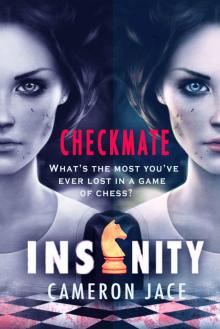 Checkmate (Insanity Book 6)
Checkmate (Insanity Book 6) Ashes to Ashes and Cinder to Cinder
Ashes to Ashes and Cinder to Cinder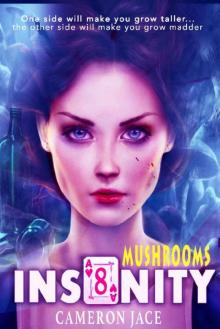 Mushrooms
Mushrooms Beauty Never Dies
Beauty Never Dies The Grimm Diaries Prequels Volume 15 - 18
The Grimm Diaries Prequels Volume 15 - 18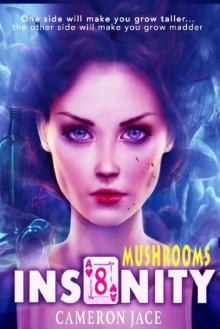 Mushrooms (Insanity Book 8)
Mushrooms (Insanity Book 8)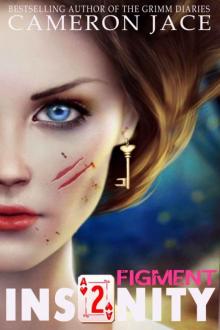 Figment
Figment Family (Insanity Book 7)
Family (Insanity Book 7) Blood, Milk & Chocolate - Part 1 (The Grimm Diaries Book 3)
Blood, Milk & Chocolate - Part 1 (The Grimm Diaries Book 3) The Grimm Prequels Book 5: (Prequels 19-24)
The Grimm Prequels Book 5: (Prequels 19-24) Mary Mary Quite Contrary ( A Grimm Diaries Prequel #5 )
Mary Mary Quite Contrary ( A Grimm Diaries Prequel #5 ) Cinderella Dressed in Ashes tgd-2
Cinderella Dressed in Ashes tgd-2 Happy Valentine's Slay ( A Grimm Diaries Prequel 10.5 )
Happy Valentine's Slay ( A Grimm Diaries Prequel 10.5 ) Snow White Blood Red ( A Grimm Diaries Prequel #1 )
Snow White Blood Red ( A Grimm Diaries Prequel #1 ) Snow White Sorrow (The Grimm Diaries)
Snow White Sorrow (The Grimm Diaries)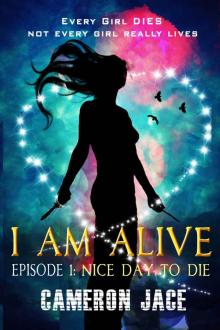 Nice Day to Die (I Am Alive Book 1 Episode 1) (A Young Adult Dystopian) (I Am Alive serial)
Nice Day to Die (I Am Alive Book 1 Episode 1) (A Young Adult Dystopian) (I Am Alive serial)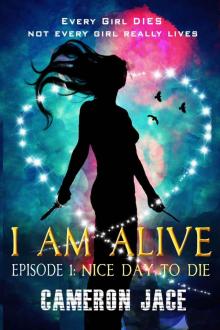 Nice Day to Die
Nice Day to Die Wonder (Insanity Book 5)
Wonder (Insanity Book 5)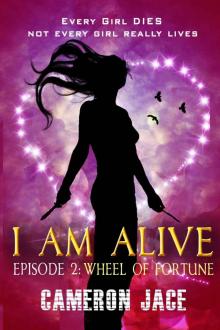 Wheel of Fortune
Wheel of Fortune Ladle Rat Rotten Hut
Ladle Rat Rotten Hut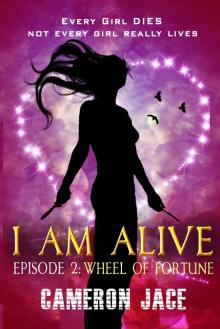 Wheel of Fortune ( I Am Alive Series Book 1 Episode 2 ) (I Am Alive serial)
Wheel of Fortune ( I Am Alive Series Book 1 Episode 2 ) (I Am Alive serial) Snow White Blood Red
Snow White Blood Red